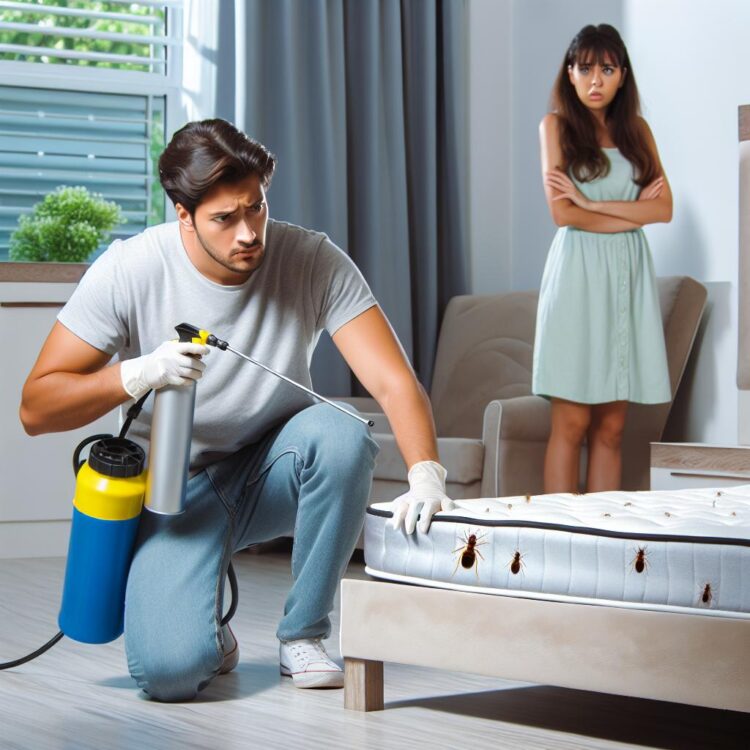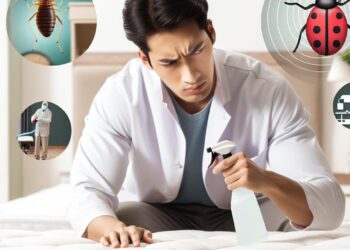Bed bugs are a stubborn nuisance, aren’t they? Dealing with them can feel like fighting an invisible army invading homes and businesses. These pesky critters hide in cracks and crevices, making them tough to eliminate. But did you know there are specific chemicals designed to target both bed bugs and their resilient eggs? Recognizing which chemical swiftly tackles these pests can save your health, home, and peace of mind. In this blog, we’ll unravel the mystery of effective pest control strategies to shield your environment, explore common challenges, and arm you with practical solutions to reclaim your space.
Understanding the Impact of Bed Bug Killing Chemicals
Oh, the dreaded bed bug! If you’ve found yourself caught in their unpleasant company, you’re not alone. Bed bugs are tiny, brownish insects that thrive on the blood of humans and animals. You’ll most likely find them in places like beds, sofas, and other cosy nooks where they can hide during the day. These pests are nocturnal, meaning they feast while you sleep—how cheeky is that? When it comes to dealing with these critters, one potent chemical used is Pyrethroid. It’s known for effectively eliminating bed bugs and their eggs, bringing some relief from their itchy bites. Spotting an infestation isn’t always easy. Look out for signs like small rust-colored stains on bedding, a musty odor, or tiny eggs and molted skin scattered around their hideouts. Left unchecked, bed bugs can cause sleepless nights, itchy bites, and endless frustration. But fear not—you’re not powerless to stop them!Understanding the Most Common Issues Faced with Bed Bug Chemicals
Dealing with bed bugs is nasty business! They’re resilient and ingenious at hiding, making them a common nuisance in UK homes. What about the chemicals used to eliminate them? While they prove effective, they might not be free from drawbacks. Let’s discuss some common problems.- Structural Damage: Certain aggressive chemicals can inadvertently harm the materials in your home. They might corrode metal fittings or discolour wooden surfaces, posing unexpected repair costs.
- Health Risks: Many chemicals are powerful, but they’re not always friendly to humans. Overexposure can lead to respiratory issues, skin irritations, or allergic reactions. Who wants a hacking cough alongside a bed bug infestation?
- Food Contamination: Using pesticides in food storage areas? It’s a bit of a sticky wicket. Chemicals can taint foodstuffs, making them unsafe to eat. Best to triple check those pantry shelves after treatment!
- Property Devaluation: Regular use of harsh chemicals might lead to wear and tear, not to mention the impact on your home’s market value. Nobody wants their dream house tarnished by persistent pest control remnants.
- Damage to Pets and Gardens: Our furry friends, and even the garden plants, aren’t always immune to these substances. Pets might experience adverse effects from contact, while garden flora could wither with runoff chemical exposure.
- Ecological Effects: Let’s not forget Mother Nature! Some of these chemicals can seep into the soil or water systems, affecting local wildlife or contributing to pollution. It’s great to be rid of bed bugs, but we shouldn’t sacrifice the environment in the process.
Natural & Effective Home Remedies for Eliminating Bed Bugs
-
Essential oils: One of the best natural remedies for dealing with bed bugs is essential oils like lavender and tea tree oil. These oils have insecticidal properties that can help eradicate bed bugs. Mix a few drops with water in a spray bottle, and spray it on areas you suspect bed bugs are hiding. While it might not kill them instantly, it can deter them and, over time, reduce their numbers. Plus, your home will smell delightful!
-
Vinegar: This everyday kitchen item is more than just a salad dressing. Undiluted white vinegar can be sprayed directly on bed bugs and their eggs. The acidic nature damages their exoskeletons and prevents hatching. While it’s not the most potent solution on its own, it can be an effective part of a broader pest control strategy for minor infestations.
-
Diatomaceous earth: This natural powder is made from fossilised algae and works by dehydrating insects. Dust it lightly over infested areas like mattresses, bed frames, and skirting boards. It’s a slow process, but effective over time when the bugs come into contact with it. Just be patient, and keep reapplying every few days to areas that remain infested.
-
Herbs: Certain plants, like mint and lavender, can naturally repel bed bugs. These herbs can be placed in sachets and tucked under pillows or in cupboards. While herbs alone might not completely solve a bed bug problem, they work well as a preventive measure and add a fresh scent to your space.
-
Home-made traps: You can craft simple bed bug traps using items like sugar and yeast to create a CO2 trap that lures them in. Place the trap near your bed or where infestations are suspected. It won’t get rid of all of them, but it’s a good indicator and can catch some of these pesky critters.
-
Natural predators: Ladybugs and certain kinds of beetles can be introduced into your home. They’re known to feast on bed bugs and other small pests. It’s a tiny eco-system working in your favour, but be sure to handle it gently as an auxiliary measure.
Chemical treatments for exterminating bed bugs and their eggs.
Getting rid of bed bugs and their eggs can be a real headache, but the right chemical treatments can make a world of difference. Here’s a rundown of some effective chemicals commonly used to combat these pesky critters:
- Pyrethrins and Pyrethroids: These are two of the most popular chemicals used to kill bed bugs, and they work by attacking the insects’ nervous systems. To apply, spray the solution directly onto the areas where bed bugs are hiding, ensuring maximum contact.
- Neonicotinoids: Acting on the nicotinic acetylcholine receptors, neonicotinoids effectively paralyze and kill bed bugs. They’re great for cases where bed bugs have developed resistance, so apply them generously in infested areas.
- Insect Growth Regulators (IGRs): IGRs don’t kill adult bed bugs right away, but they disrupt the development of their young. Spritz these chemicals in areas where eggs are likely laid to interrupt their life cycle. This ensures fewer new bugs to deal with over time.
- Desiccants: Chemically, desiccants like diatomaceous earth dry out bed bugs by damaging their protective coating. Spread them in powder form in thin layers in areas you suspect bed bug activity. But remember, they take a bit longer to work!
Smart Prevention Tips: Keep Bed Bugs and Their Eggs Away
It’s important to stay on top of potential pest problems before they become absolute nightmares. An effective way to ensure your home stays pest-free is by adopting prevention strategies. Here’s a structured list to guide you through:- Proper Waste Disposal and Cleanliness: Keep your home tidy and dispose of rubbish regularly. Pests like rodents and cockroaches are attracted to leftover food and rubbish bins.
- Sealing Entry Points and Cracks: Regularly inspect your home for cracks and holes that might serve as entry points for pests. Use caulk or other appropriate materials to seal them.
- Using Pest Deterrents: Install screens on windows and doors to prevent pests from entering. Consider using natural deterrents like essential oils or herbs, which can be effective and non-toxic.
- Regular Inspections and Maintenance: Schedule regular inspections for signs of pests. Look for droppings, nest materials, or unusual smells. If needed, consult professional pest control services for a thorough check.
- Garden Maintenance: Keep your garden neat and remove any debris, as these can attract pests. Trim trees and bushes to keep them from touching your house, preventing easy access to pests.
- Proper Food Storage: Store food items in airtight containers to keep them safe from pests. Ensure your pantry is clean and free of crumbs.
- Check for Leaks: Fix any leaks promptly, as moisture can attract pests like termites and mould-producing insects.
- Pet Care: If you have pets, make sure their bowls are clean and food is not left out for too long, as this can attract pests like ants or flies.
Debunking Myths: Chemicals That Effectively Kill Bed Bugs and Eggs
| Myth | Fact |
|---|---|
| All chemicals kill bed bugs and their eggs. | Not all chemicals are effective; only specific pesticides target bed bugs and their eggs, such as pyrethroids and neonicotinoids. |
| Home remedies like vinegar or essential oils can eliminate bed bugs. | While they may repel, these remedies aren’t effective at killing bed bugs or their eggs and should not be relied upon for serious infestations. |
| It’s safe to use outdoor-grade pesticides indoors for bed bugs. | Outdoor pesticides can be harmful indoors. Always use products labeled safe for indoor use on bed bugs. |
| More chemicals equal better results. | Overusing chemicals can be dangerous. It’s about using the right amount of a targeted product rather than volume. |
| Foggers or bug bombs kill all bed bugs. | Foggers are often ineffective for bed bugs as they don’t reach the hiding spots or eggs, and may even spread them further. |















